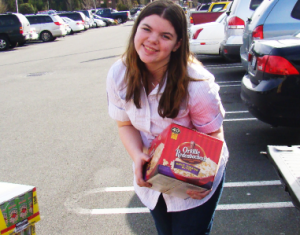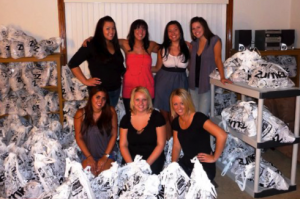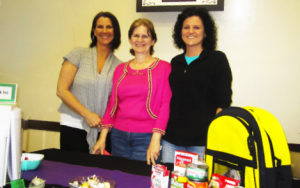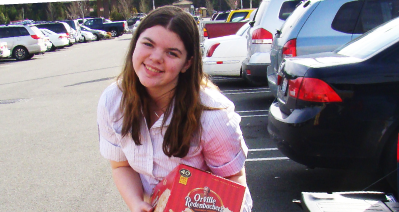 Kelly Wilson told me a story that any group of girlfriends could have had. While sitting around the dinner table one night, Kelly and a gathering of other moms and grandmothers started talking about the most effective way to help homeless people.
Kelly Wilson told me a story that any group of girlfriends could have had. While sitting around the dinner table one night, Kelly and a gathering of other moms and grandmothers started talking about the most effective way to help homeless people.
The conversation expanded beyond “just talk” and each party-goer decided to bring one survival item, to their next gathering, to fill 20 backpacks. They loaded the backpacks and set out a few days before Thanksgiving 2004 with the Lacey Police Department to deliver the backpacks to the area’s homeless men and women.
The Olympian picked up the story and ran a front page picture of a volunteer distributing a pack to a homeless man. Kelly had innocently given the reporter her home phone number so he could contact her with further questions. “At the bottom of the article was my phone number,” says Kelly who then recalls how her phone rang off the hook.
“People didn’t know that we weren’t a formal group. We didn’t have a name or anything. We were just a group of girlfriends who wanted to do something to help,” says Kelly.
Over the course of the next few months, Kelly’s group organized, learned more about homelessness from community experts, and opted to focus on homeless teens.
 “One of the gaps that we found is that homeless kids get fed breakfast and lunch at school but there are very limited options over the weekend,” reports Kelly. The group spent some time with Robert Coit at the Thurston County Food Bank to design a program to provide food on the weekend for homeless high school teens.
“One of the gaps that we found is that homeless kids get fed breakfast and lunch at school but there are very limited options over the weekend,” reports Kelly. The group spent some time with Robert Coit at the Thurston County Food Bank to design a program to provide food on the weekend for homeless high school teens.
And, the Homeless Backpack program was formed.
A student receives a nondescript backpack from their high school counselor. Each pack is stuffed with shelf-stable products such as tuna, ravioli, chili, fruit cups, granola bars, oatmeal, juice boxes, chocolate milk and assorted snacks. Each bag costs $8 – $10 per week.
The program started small, with 5 kids in Tumwater. “Counselors talked to counselors and we are now serving 293 students per week across Thurston County plus McCleary and Shelton,” says Kelly who admits that they have had to put a cap on the number of students they can serve.
“This program is a life line for my homeless students,” says Timberline health room assistant Deanna East.
The team is completely volunteer and all operational funds are raised through donations.
What does it take to shop, pack, and distribute 293 backpacks?
- A team of shoppers enters Costco twice per month and loads down carts. “They shop for 600 bags at a time. It’s back breaking work. Imagine lifting 48 cases of ravioli off the shelves, onto your cart, into your car, and then into our storeroom,” says Kelly with a sigh of appreciation for this crew.
- The bagging team sets up banquet tables with tubs of food. The food is the same every week to keep the program simple. Church groups and high school students often join in to help bag the food.
- Delivery teams branch out to take the food to area high schools. “This is another tough job. A volunteer hauls 50 backpacks to Yelm, for example, that are weighted down with cans of food,” reports Kelly.
- School counselors and health room aides privately distribute the backpacks to students. All students are anonymous to the volunteer crew.
 The team also manages an email distribution list called the Circle of Love. Kelly distributes notes for special items that some kids may need.
The team also manages an email distribution list called the Circle of Love. Kelly distributes notes for special items that some kids may need.
“They have given clothes, shoes, bus tickets, tent, sleeping bags, cap and gowns, card and gift at graduation,” comments Deanna.
“Recently, a kid’s tent was vandalized and all of his belongings where stolen. We were able to get his supplies replaced within 24 hours,” reflects Kelly.
By volunteering, Terryl Graham knows that she has made a difference. “In the past 4 years, about 70 kids who have received assistance from our program have graduated high school,” states Terryl, the group’s Secretary since its inception.
Kelly is focused on keeping the program simple so that it can be sustained long-term. One day, while driving between the North Thurston high schools, Kelly brainstormed a more efficient way of delivering the packs.
 Now, a volunteer makes a giant delivery to the Lacey Police Department. Resource officers that work in each school pick up the allocated number of packs and bring them to the school for their daily shift.
Now, a volunteer makes a giant delivery to the Lacey Police Department. Resource officers that work in each school pick up the allocated number of packs and bring them to the school for their daily shift.
“It’s the ideal model – a community taking care of itself,” she adds.
The Homeless Backpack program is facing a 30% deficit based on the rising costs of food. All of their food is bought locally at regular market prices.
“A canned tuna drive – if someone could organize that, it would help us immensely. It’s our highest priced food item but also a great source of protein,” comments Kelly.
“It’s a really simple program that makes a difference,” says Kelly. “We want the kids to feel the love that goes into each bag. We are each doing this because we want to support these kids. I want them to know that we are in their corner and rooting for them to succeed in life and school,” she adds.
“This group is amazing in its ability to provide help to hungry kids,” summarizes Deanna.
To learn more about the Homeless Backpack program, visit www.homelessbackpacks.org.


















































